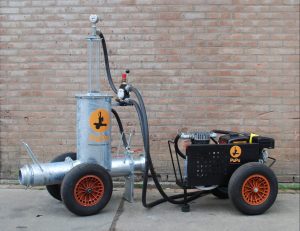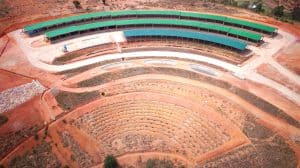Sanitation
Enabling sanitation services through disruptive technology
How does disruption look in the sanitation sector? Where in the sanitation chain is technology already disrupting? What do we need to scale disruptive technologies that work? These were some questions that the session on “Disruptive Technologies for Universal Safely Managed Sanitation and Hygiene” sought answers for during the Stockholm World Water Week.

Disruptive technology
Disruptive technology in the sanitation sector is not limited to technology with a low price point, serving unserved people, and then using that to change how services are delivered. It goes beyond a market entry strategy and reflects technology that fundamentally results in or demands systemic changes that accelerate sustainable and universal service provision. Therefore, disruptive technologies go hand in hand with disruptive rules and policies and can serve as turning points that transform sanitation service delivery. Examples from the session of emerging and scaling technologies that have the potential to disrupt the sanitation chain include the PuPu pump, real-time monitoring of faecal sludge collection and transportation, the Faecal Sludge Snap App and Waste to Value faecal sludge treatment plants.
Creating a disruptive environment
While technology is important, it is not a silver bullet by itself. The enabling environment i.e. rules, policies, norms and regulations, mandates, markets, partnerships and capacity are crucial for technologies to scale. Changing the enabling environment can create windows of opportunities for innovations to thrive. Similarly, disruptive technologies may foster changes in the enabling environment. Therefore, for disruptive technologies to scale and increase their impact, they require an environment that is flexible and adaptive to change. Such an enabling environment manifests in innovative approaches to achieve universal sanitation service delivery, such as citywide inclusive sanitation (CWIS).
Stakeholders operationalize the enabling environment. Therefore, to achieve scaling, all stakeholders including funders, researchers, politicians, technical practitioners, private sector and targeted users have a role to play. Their capacity to fulfil their respective roles and responsibilities while maintaining productive partnerships is essential for technologies to move beyond the laboratory and achieve scale.
About the session
This was a main session at the Stockholm World Water Week 2023 on Thursday 24th August 2023. It was convened by Bill and Melinda Gates Foundation, Eawag, Freaklabs, Practica and the World Bank Group. Dr. Linda Strande, Mr. Miguel Vargas-Ramirez and Mr. Brian Arbogast organized/conceived of the session and it was it was co-moderated by Dr. George Wainaina (onsite) and Ms. Palesa Mokorosi (online).
Disruptive technology in the sanitation sector is not limited to technology with a low price point. Disruptive technologies go hand in hand with disruptive rules and policies and can serve as turning points that transform sanitation service delivery.
Implementing a full FSM chain in Fianarantsoa, Madagascar
Since 2018, we have been working with the municipality of Fianarantsoa in Madagascar to implement a full FSM chain with a pro-poor focus to serve its population better. This project funded by Metropole de Lyon, SIAAP, AERMC, and SAUR directly contributes to the SDG6 access to “Clean water and sanitation” for all.

Although services and infrastructures for sanitation existed in Fianarantsoa before the beginning of our intervention, their condition was insufficient. Low managerial skills, lack of technical capacity and lack of tools and infrastructures were responsible for the low performance of the faecal sludge management chain. Our role in the 3F project and its follow-up, the Eaurizon 2025 project, is to identify the gaps and develop durable solutions.
During the first part of our intervention, we focussed on a few districts (Fokontany), where we constructed public toilet facilities, set up emptying and dumping services, reinforced the capacities of private operators and the municipality to improve the service level in the area, and tested monitoring and evaluation tools. After obtaining successful results, our intervention is now about to be scaled up to the rest of the city and we will also work on household toilet facilities.
A multi-level intervention to implement a sustainable FSM chain
- Material & infrastructures: We constructed and rehabilitated 10 public toilets. In the second phase of our intervention which started in October 2021, we are about to do the same with 13 additional toilets. We will also construct individual toilets to serve 2,400 poor households. In parallel, we achieved the construction of a treatment plant for faecal sludge on the outskirts of the city, which is already operational. The plant is meant to offer a safe place for the sludge deposition and avoid dumping, creating a major public hygiene risk. We will now focus on finding ways to improve improving pit latrine emptying facilities, and the sludge treatment process and increase the safety of the final product to make it marketable (e.g. for agricultural use), thereby contributing to the circularity of the FSM chain.

- Operational & organisational: To ensure the quality and sustainability of the FSM infrastructures and services, we organised and capacitated public and private actors involved in the chain. The management of the FSM services (toilets, collection, transport and treatment) has been entrusted to private operators who also followed technical and managerial trainings. Supervising the chain via regular monitoring and evaluation of the services is the municipality’s responsibility. The city of Fianarantsoa also has the responsibility to see that public rules and regulations (e.g. prohibition of urinating in the street) are being enforced. While we are now extending the FSM chain in new areas of the city, we will train and reinforce the capacities of new actors.
- Institutional: Since 2018, we have supported the city of Fianarantsoa to update, and create policies and regulations that are applicable, enforceable and contribute to improving public hygiene and health. Some of the existing texts were not clear and therefore, not enforceable. We worked with the municipality to improve them and create new rules facilitating the implementation of the FSM chain. For instance, it is now forbidden to request services of informal manual emptiers, who are not licensed and dispose of faecal sludge in the environment. Only approved businesses, that received training and whose work is monitored are allowed to collect, transport and treat sludge. It ensures good working conditions and proper management and treatment of the sludge. Finally, we established communication campaigns with the municipality to promote public hygiene and introduce new services to the population.
Building a strong FSM chain is a long-term work with multiple actors from the public and the private sectors. Infrastructure and services needed to be set up in Fianarantsoa and a long-term strategy and management structure had to be established. For that, we developed business cases for each type of service, provided technical trainings and reinforced the capacities of all actors from a managerial perspective. Now, our goal is to scale up the results obtained in a few Fokontany (districts) to the whole city and to keep on supporting the public and private actors until we are convinced that the ecosystem is fully stable and self-sustaining.
Watch a video about the results of our intervention in Fianarantsoa during the 3F project.
Watch it here in English and here in French.
For the last 3 years, Practica Madagascar implemented a full FSM chain in Fianarantsoa, Madagascar.
This video illustrate the 3 project components : (1) Public toilets, (2) Pro-poor FSM services & (3) Sanitary regulation.

